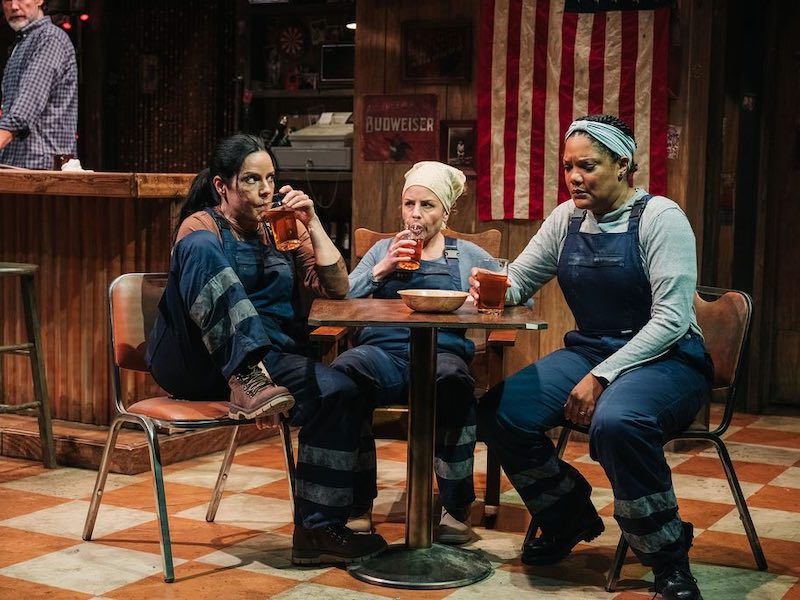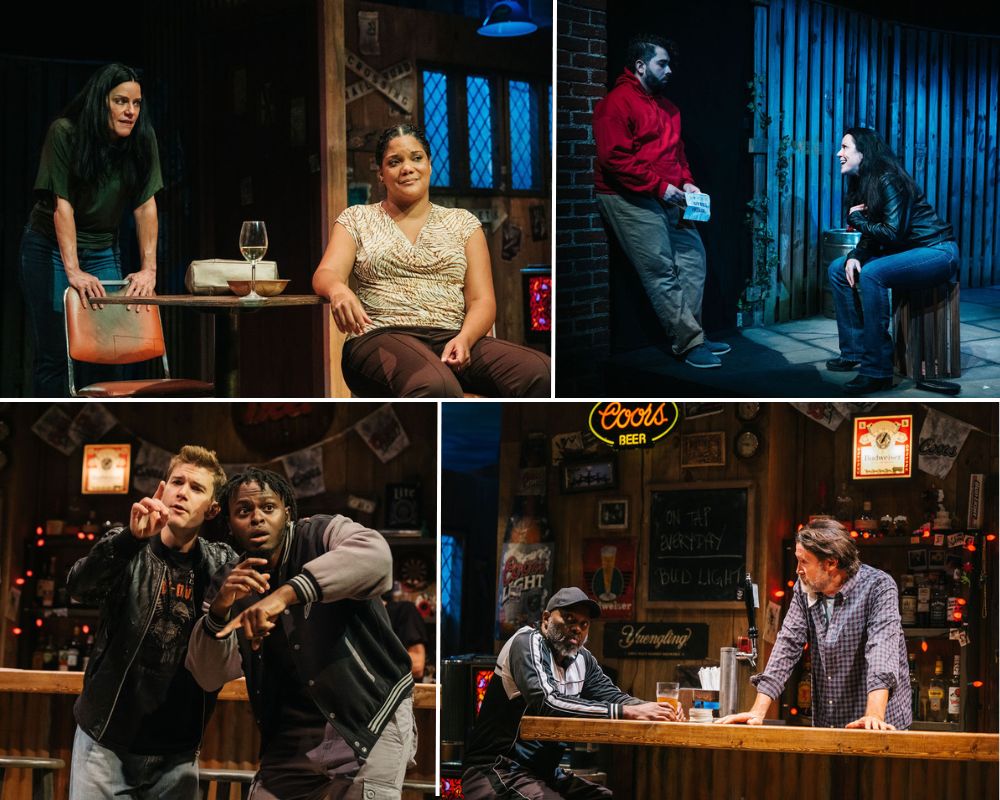What happens to a city and its communities when the primary employer in that city shuts down? This is what happened in the city of Reading, Pennsylvania, where Sweat — now playing at the Keegan Theatre — takes place.
In 2011, the playwright Lynn Nottage began interviewing residents of Reading, which with a poverty rate of over 40 percent was officially one of the poorest cities in America. The play takes place in a bar in Reading where many of the steelworkers gather to bond and relax. It is in this bar that Nottage plays out in intimate detail what happens to the people — to the city — when its industry is moved out of the country.

The people in this bar are people who would vote for Donald Trump. The battle between rugged individualism and the corporate control and manipulation of those individuals’ lives and potential turns out to be no battle at all.
Sweat does not deal with the “politics” of this devastation. There are no Republicans or Democrats here. And the corporations that cause this communal devastation through such tools as NAFTA (as bartender Stan points out) are invisible. We encounter the perpetrators of this devastation only in 60-second news bites on the radio. The play focuses on the human connections that are irrelevant to corporate survival and are inevitably chewed up when they no longer serve the corporate interest.
Sweat‘s strong, steady-eyed look at the current state of the union at a neighborhood and personal level is powerfully delivered through the uniformly strong acting of its cast and the clear-eyed yet lyrical direction by Angelisa Gillyard, whose staging is almost dance-like. The action repeatedly moves from the fully occupied bar to an intimate duo or trio, then back to the full bar again. Rather than having the actors freeze when the focus is not on them, Gillyard has them maintain their activities and relationships at a level that is still vivid but muted. The audience is guided to experience how the intimate scenes relate to and are stimulated by the larger scene and vice versa.

Watching this interplay of characters and forces staged in this way made it feel at times as though both the characters and the audience were in a kind of trance or shock. That feeling of trance or shock accurately reflects the way many people feel when thinking about the shifts that have occurred in this country. We moved from the era of having strong workers’ unions, fighting fascism, the policies of Roosevelt’s New Deal, the establishment of Social Security, the racial integration of the armed forces and the public education system, to the sudden violent and apparently unopposed reversal of those efforts. It is mind-boggling for the characters as well as the audience. And the staging of Sweat compellingly embodies that confusion.
A triumvirate of women — Cynthia (Lolita Marie), Jessie (Santine Maiolatesi), and Tracey (Susan Marie Rhea) — are a fierce sisterhood: co-workers who hang out at the bar, which is presided over by former mill worker, Stan (Jon Townson), who had to find new employment after being injured on the job. At the opening of the play, we discover that management at the steel mill has an opening and has asked for applicants from the floor workers. Upon hearing that Cynthia (who is Black) has applied, Tracey (who is white) decides to apply also. Cynthia is hired. With Cynthia as the Black face for their actions, the company then begins to press the union for concessions. The union goes on strike and the company locks the workers out and overnight to moves jobs to Mexico.
Cynthia’s son Chris (Jamil Joseph) and Tracey’s son Jason (Bowen Fox) are best friends. Chris wants something better than life as a factory worker and aims to go to college. His plans are undermined when the steel mill shuts out its union workers, leaving him without the income he needed to use to begin attending school. Oscar (Andrés F. Roa), the Colombian busboy at the bar, sees a flyer — written in Spanish — advertising open positions at the steel mill. He applies and is hired, crossing the picket line composed of many of the bar’s customers. Breaks in relationships mount and violence erupts resulting in time spent in jail for Chris and Jason. The play jumps back and forth in time from before the young men are incarcerated to their recent release and their re-evaluating what got them thrown into jail and what it will take to make things, as Oscar states at the play’s conclusion, “the way they are supposed to be.”
DeJeanette Horne as Cynthia’s husband Brucie was completely unrecognizable to me in this role, even though I’ve seen him in several performances. His seductive, repentant, but not-quite-reformed addict, parent, and community member was surprising and empathy arousing. I would love to see him perform the narrator/father role in Into the Woods.
The evocative set (Matthew J. Keenan) and lighting (Alberto Segarra) not only place us in the bar but also establish succinctly and cleverly the parking lot (which we experience via the headlights of the parking cars as they turn into the lot and reflect off the fence bordering the adjacent property). Cynthia’s down-sized home and numerous other spaces are suggested in a believable and essential way. Johnna Presby’s costumes were supportive yet inconspicuous except when they needed to be otherwise: Jessie’s adamantly flamboyant dresses were the most notable and fun.
Sweat is very much like the iconic, feel-good TV show Cheers except that in Sweat there is no laugh track, and the unraveling of the social ties that hold the patrons of the local bar together is out in the open and seething.
The question Sweat puts forward is how are we to live our lives so that corporate influences on them are irrelevant? And how do we ensure that the ties that bind continue to do so?
Running Time: Approximately two hours and 25 minutes, with a 15-minute intermission.
Sweat plays through September 16, 2023, Thursdays through Sundays, at the Keegan Theatre, 1724 Church Street NW, Washington, DC. Tickets ($50, with discounts available for patrons under 25 and over 62) may be purchased online, by phone at 202-265-3767, or in person at the Keegan Theatre Box Office, which opens on the day of the show one hour prior to the performance.
COVID Safety: Masks are optional but encouraged. Keegan’s Health & Safety Policies are here.
Sweat
Written by Lynn Nottage
Directed by Angelisa Gillyard
CAST
Evan: Deimoni Brewington
Jason: Bowen Fox
Brucie: Dejeanette Horne
Chris: Jamil Joseph
Jessie: Sanatina Maiolatesi
Cynthia: Lolita Marie
Tracey: Susan Marie Rhea
Oscar: Andrés F. Roa
Stan: Jon Townson
PRODUCTION TEAM
Director: Angelisa Gillyard
Stage Manager: Luís Ramon Córdovez
Assistant Stage Manager: Mikaela Phillips
Props/Set Dressing Designer: Cindy Landrum Jacobs
Resident Scenic Designer/Lead Carpenter: Matthew J. Keenan
Costume Designer: Johnna Presby
Lighting Designer: Alberto Segarra
Sound Designer: Ian Vesperman
Fight & Intimacy Director: Sierra Young
Fight Captain: Deimoni Brewington
Technical Director: Josh Sticklin
Resident Electrics Supervisor: Ben Harvey




